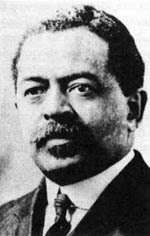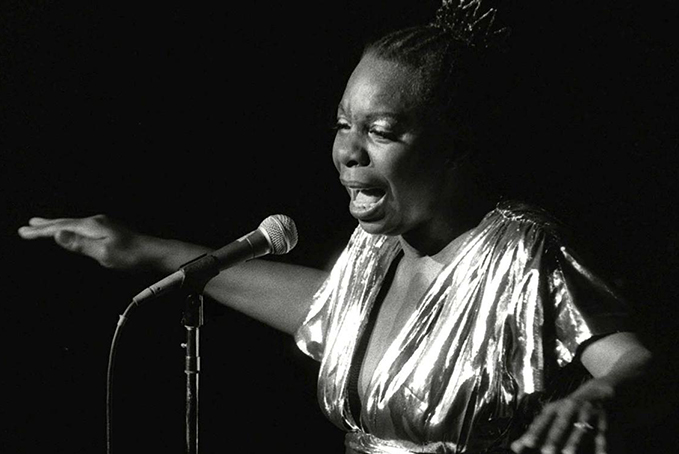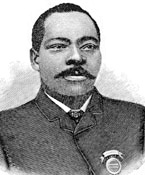-
APRIL 17

1872—Activist and fiery journalist William Monroe Trotter is born on this day in Boston, Mass. A close friend of W.E.B. Du Bois, Trotter was one of the most militant Black leaders of the late 1800s and early 1900s. He helped found the Niagara Movement, which led to the establishment of the NAACP but then refused to join, claiming the group was too moderate and elitist. He was also a leading opponent of the accommodating policies of Booker T. Washington. Trotter’s primary vehicle of expression was his newspaper—the Boston Guardian.
-
APRIL 18
1818—Military leader Andrew Jackson (later president) leads the defeat of a force of Indians and Blacks at the Battle of Suwanee, bringing an end to the First Seminole War. The Seminoles had been the target of a government military campaign because they possessed lands, which Whites in Florida greatly desired, and because they had provided safe haven for escaped slaves. Indeed, Blacks such as John Horse would become major Seminole leaders. It would take at least two more major military campaigns before the Seminoles and their Black allies lost possession of those lands.

1977—Alex Haley, author of “Roots,” is awarded the Pulitzer Prize.
-
APRIL 19
1910—The National Urban League is formed in New York City. It was born out of a merger of the National League for the Protection of Colored Women, National League on Urban Conditions among Negroes and remnants of the Niagara Movement which had earlier help found the NAACP. Among the leading organizers were Ruth Standish Baldwin and George Edmund Haynes. The organization was founded in part to be more focused on economic issues affecting Blacks than the NAACP. Today, it is generally considered the nation’s second most powerful civil rights organization after the NAACP.
1971—Walter Fauntroy becomes the first elected Congressional representative from the predominantly Black District of Columbia since Reconstruction. However, Fauntroy did not have voting rights. Indeed, down to this day, the Congressional Representative from Washington, D.C., is still not allowed to vote on major legislation. This bar was once common among capitol cities. But today, America stands virtually alone among major nations in barring the residents of its capitol city from having a voting representative in its national legislature. Critics argue that the bar continues because the city is majority African-American.

1978—Max Robinson becomes the first African American anchor of a major network television news program when he begins co-anchoring ABC nightly news from Chicago. The Richmond, Va., native died of AIDS in Washington, D.C., on Dec. 20, 1988.
-
APRIL 20
1871—The Third Enforcement Act is enacted. The Act was designed to give the president greater powers to suppress the actions of terrorist organizations such as the Ku Klux Klan, as they attempted to stop Blacks from voting. In some instances, the racist groups used armed force to drive out integrated governments in several Southern cities. Under the Act, the president could declare such activities “rebellion against the government” and employ federal troops to restore order.

1899—Jazz great Edward “Duke” Ellington is born in Washington, D.C. Ellington was perhaps the greatest of the Jazz pioneers, popularizing Jazz with his performances, composing and his role as a bandleader. Ellington died in 1974.
1909—Jazz great Lionel Hampton is born in Louisville, Ky. Hampton was another of the great band leaders of the Jazz era. He was also known for his skills on the vibraphone. He died in 2002.
1971—The United States Supreme Court rules unanimously that the busing of students from schools of predominantly one race to schools populated most by students of another race was a constitutionally accepted method for integrating the nation’s public schools.
-
APRIL 21
1898—An official state of war is said to exist between Spain and the U.S. over Cuba. This Spanish American War was fought with major representation of Black soldiers from Alabama, North Carolina, Virginia, Illinois and Kansas. For imperialistic reasons of its own, the U.S. aided Cuban independence from Spain. Cuba became independent in 1902. However, when the Black troops returned to America, their greetings ranged from parades and speeches in some cities to assaults and lynching in other cities.

2003—African-American song stylist Nina Simone, born Eunice Kathleen Waymon, dies in Paris. She was was an American singer, songwriter, pianist, arranger and civil rights activist. Over the length of her career Simone recorded more than 40 albums, mostly between 1958, when she made her debut with “Little Girl Blue,” and 1974. She was 70 years old.
-
APRIL 22
1692—The notorious “Salem Witch Trials” of Salem, Mass., claim their first Black victim. Mary Black, a slave, is accused of sorcery and jailed. The hysteria created by the trials would lead to the arrests of 141 people (mostly women) and result in 19 of them being put to death. Ironically, there is reason to believe that the witch trials were indirectly set in motion by the voodoo stories of a Black slave. It seems that a minister brought to Salem a slave from Barbados named Tituba. He fascinated the minister’s daughters with stories about witchcraft in Africa and the Caribbean. The two daughters shared the stories with other young girls in the area and soon imagination took the place of reality. The girls started acting strangely and claimed they were victims of witchcraft. Superstitious adults began pressuring them to name names and soon dozens of women were being jailed for practicing witchcraft. The trials, which were not limited to Massachusetts, but spread throughout New England, are perhaps one of the greatest testimonies to how minds can be twisted to believe in the ridiculous and hurt others of as result of false belief.
1922—Jazz great Charles Mingus is born. The virtuoso bass player was born on a military base in Nogales, Ariz.
-
APRIL 23

1856—One of the greatest inventors in American history, Granville T. Woods, is born in Columbus, Ohio. During his life he received 65 patents for electrical, mechanical and communications devices. Among his inventions was an advanced telephone transmitter. The transmitter was so advanced that the Alexander Graham Bell Company purchased the rights to it from Woods, both because it was superior to what Bell had invented and for fear that Woods might become a major rival to the Bell Company. At his height, the Cincinnati, Ohio Catholic Tribune (Jan. 14, 1886) wrote of Woods: “…the greatest colored inventor in the history of the race and equal, if not superior, to any inventor in the country…”

1872—Charlotte E. Ray becomes the first Black female lawyer in American history. Born in New York City to a journalist father and a politically active mother, Ray was a brilliant student who was teaching at Howard University in Washington, D.C., by the time she was 19. By age 22 she had her law degree and was admitted to the D.C. bar. However, sexual and racial discrimination forced her to abandon her law practice and return to New York to teach. She died Jan. 4, 1911.
1971—Liberian President William Tubman dies. Tubman and his strong-man rule had kept the West African nation founded by freed American slaves relatively stable but not necessarily democratic. His death laid the foundation for the anarchy and civil wars which would grip the nation for the next 30 years. Tubman also headed a class of so-called Americo-Liberians who often discriminated against the native African population.